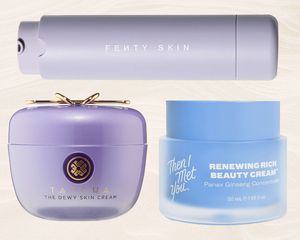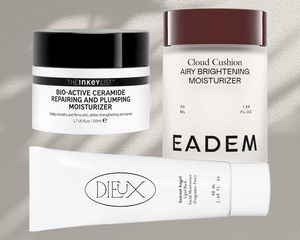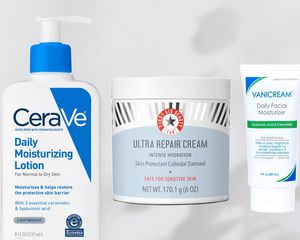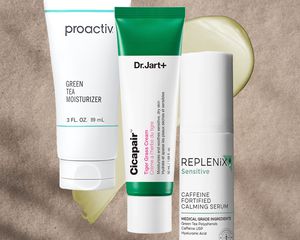:max_bytes(150000):strip_icc()/Stocksy_txp60bb3398u0f300_Medium_4000378-6359df5ec95446c98cdb9644123aace9.jpg)
Stocksy
The key to happy, healthy, hydrated skin is moisture. It's best to apply your moisturizer right when you get out of the shower to lock in all of the good stuff that keeps skin soft. But which product should you be reaching for? Beauty options for hydrated skin include body oil, lotion, or body butter, but the choice is dependent upon your skin's needs.
Some people with skin conditions such as keratosis pilaris prefer body oil to help fade the redness and texture of this condition, while others prefer a creamy lotion. Still not sure? We asked two dermatologist and a skincare founder to compare and contrast body oil, lotion, and body butter, so you can figure out your best path to healthy, supple skin.
Meet the Expert
- Gloria Noto is a makeup artist and the founder of natural skincare brand Noto Botanics.
- Rachel Nazarian, MD, FAAD, is a board-certified dermatologist at Schweiger Dermatology Group in New York City.
- Brendan Camp, MD, FAAD, is double board-certified dermatologist, who specializes in dermatology and dermatopathology at MDCS Dermatology: Medical Dermatology & Cosmetic Surgery in New York.
Keep reading to see which option is best for you, below.
:max_bytes(150000):strip_icc()/lotion-vs-oil_rev_color-9726190878124891b29e75e4a98e0324.png)
Body Oil vs. Lotion vs. Body Butter
Body oil, lotion, and body butter are all meant to moisturize the skin, but where they differ is in thickness and the way they boost hydration and water retention:
Oil
Oils help re-introduce lost moisture to the skin (think: post-cleansing or exfoliating). "Body oils are composed primarily of oils; they are lightweight and provide skin hydration and shine," says Camp. "Oils sink right into the skin. It's like food for your body," adds Noto.
Lotion
Thicker and part water-based, lotions come in various forms to treat different skincare concerns—for example, those who are eczema-prone would turn to an itch relief lotion, while someone with textured skin might reach for a smoothing lotion that targets bumps. Because of the water and thicker formula, lotion can help with both water absorption and sealing moisture into the skin.
Body Butters
Body butters usually include ingredients like shea butter and cocoa butter, and feature a thick texture while also having an oil-based formula. This combination is like the best of both worlds for those with dry skin (which lacks oil, as opposed to dehydrated skin, which lacks water), as it simultaneously provides a deeply nourishing formula and seals it in to last.
Benefits of Body Oil
- Regulates sebum production: Oils are touted for their absorbent properties because many vegetable-based oils—avocado, jojoba, and almond, for example—mimic the natural lipids found in our skin. This allows for regulation and repair of your skin's moisture barrier and oil production, which helps your complexion to get more in balance.
- Improves skin barrier function: Research shows that when our skin absorbs body oils, the top layers treat said oils as their own—resulting in a reparative, moisturized effect.
- Usually skin-friendly, natural ingredients: Most oil products on the market tend to be blends of natural oils that work well with skin, just be sure the oils used in the product are non-comedogenic.
- Provides a glow: "Oils are lightweight, but often remain on the surface of the skin, which makes skin feel smooth and soft," says Camp, which can also make skin appear shimmery.
Byrdie Tip
Even if you have acne-prone or oily skin, face and body oils are worth a try. No matter how counterintuitive it seems, most dermatologists say the oil helps dial down your skin's natural sebum production since it no longer has to overcompensate for the lack of oil.
Benefits of Lotion
- Moisturizes dry skin: Nazarian says that lotion has the edge over oil if we're talking about moisturizing abilities. "Lotions are a mix of oil and water and typically work better for dry skin," she says. "Because they're partly water-based, they're often better at penetrating the skin, and can deliver ingredients that improve the ability of the skin to maintain moisture."
- Often contains ingredients with long-term benefits: "Look for lotions containing hyaluronic acid and ceramides—both enhance skin's water-retaining abilities over time," Nazarian says.
- Can prolong the life of your self-tan: Self-tanning devotees know that hydrated skin means your tan will have a longer lifespan. Just make sure you don't lather on the lotion until you've let the tan develop (aka, after you shower off the tan).
- Can be used by all skin types: According to Camp, lotions can be used by all skin types because they are lightweight and may even be appropriate for oily skin.
Byrdie Tip
Be extra wary of phantom ingredients—or worse, ingredients that will dry your skin out more—when shopping for lotion, as formulas can vary widely. "Avoid gel-based products or those containing alcohol, as these products tend to dry skin more than ointments, lotions, or creams," Nazarian explains.
Benefits of Body Butter
- Hydrates parched skin: If you have extremely dry skin (or cold winter air is wreaking havoc on your skin), body butters may be more your speed. While body lotions are typically a mix of water and oils, body butters are a mix of rich butters and oils that hydrate parched skin in need of deep moisturization and promote a smooth surface (think: shea butter combined with coconut or jojoba oil).
- Offers long-lasting hydration: Because of their key components of butter and oil, body butters are heavier and thicker in consistency when compared to oils and lotions, and they keep your skin hydrated long after you apply. They also tend to have more of an oily finish, so if your skin is chapped or cracked, body butters are better equipped to repair it.
- Can soften tougher parts of skin: According to Camp, body butter is ideal for areas of skin that are thicker or prone to frictional forces, such as the elbows and knees.
- Can be used as a cuticle treatment: "Butters can also be used to soften the hands during winter or as a cuticle treatment at night," says Camp.
How to Apply Body Oil, Lotion, and Body Butter
While each kind of body moisturizing product has its own properties, they all help you to seal in moisture, so it's best to apply them after showering. "Immediately upon exiting the shower, gently pat skin dry with a towel, and then apply your moisturizer, mixing with droplets of water still left on the skin," Nazarian says. "This will help lock in the maximum amount of hydration possible."
Dispense your product of choice and apply it all over slightly damp skin. Remember that a little goes a long way—start with a small amount, then add more as needed to be sure your skin ends up hydrated and not greasy. With all of these—but especially with body butter—pay special attention to the driest areas of your skin, such as your joints and any distinct dry patches. When you aren't fresh out of the shower but need a moisture boost, use lotion or body butter on targeted areas.
If you're looking for an extra dose of hydration for parched skin, you can layer multiple products together. Keep in mind that oil and water don't mix, so you'll want to follow a similar order to skincare on your face—use body oil to seal in a water-based lotion, or if you applied oil first, follow with body butter since it's also oil-based and can sink in. Certain gentle lotions (look for formulas that are fragrance-free and suitable for sensitive skin) may also be useful post-shaving to prevent the freshly exposed skin from getting dry as well as to calm any razor bumps or irritation.
The Drawbacks of Body Oil, Lotion, and Body Butter
While each product provide adequate hydration to skin, they do have their drawbacks as well. If you are looking for a fast absorbing product, you might want to skip body oils, especially if you don't like the feeling of slippery skin.
According to Camp, being lightweight, lotions have the least amount of oils. "As a result, they do not provide the same level of hydration as oils or butters," he says.
As for butters, their thick texture may not make them practical for year-round use. "They may be more appropriate for those with very dry skin or season use when the weather is colder, and the air is less humid," says Camp of body butters.
The Final Takeaway
Whether body oil, lotion, or body butter is best to you really comes down to personal preference, your skin type, and timing. For that reason, it doesn't hurt to have all on hand, and because lotion already contains water, it can function as your "whenever" moisturizer as needed. No matter which you prefer, keep in mind that certain ingredients can give your product of choice an additional boost, so paying attention to the formula is key. According to Noto, certain herbs, oils, and other components can have different functions to repair and nourish, so figure out what your skin needs out of a moisturizer and look for a product that fits.




